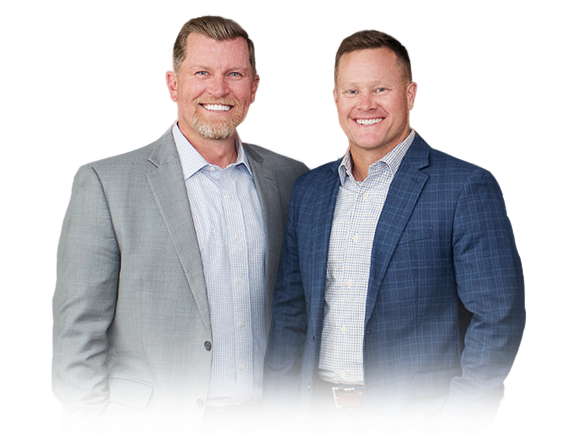 Determining who is at fault in a Utah car accident is a crucial first step in understanding your legal rights and options. Fault lays out who is responsible for the damages and injuries resulting from the accident. In Utah, this process involves specific laws and principles. Knowing these can help you navigate the aftermath of an accident more effectively. At Good Guys Injury Law, we understand Utah car accident laws. Our Utah personal injury attorney would be honored to pursue the at-fault driver in your car accident case.
Determining who is at fault in a Utah car accident is a crucial first step in understanding your legal rights and options. Fault lays out who is responsible for the damages and injuries resulting from the accident. In Utah, this process involves specific laws and principles. Knowing these can help you navigate the aftermath of an accident more effectively. At Good Guys Injury Law, we understand Utah car accident laws. Our Utah personal injury attorney would be honored to pursue the at-fault driver in your car accident case.
Fault in a car accident isn’t just about who made the mistake. It’s about understanding the laws and how they apply to your situation. Each accident is unique, and figuring out the fault is a crucial part of seeking fair compensation.
Learn more about how fault might apply to your insurance claim and personal injury protection. Then, contact us to schedule a free consultation to discuss your auto accident or car accident lawsuit.
Table of Contents
Understanding How Fault Is Determined in a Utah Car Accident
In Utah, determining fault in a car accident involves looking at the actions of each driver and how these actions contributed to the accident. It’s not always a clear-cut process. Many factors, such as road conditions, driver behavior, and adherence to traffic laws, play a role. Understanding these factors is essential in establishing who is at fault.
The process of determining fault requires a thorough investigation. Officials examine evidence from the accident scene, witness statements, and police reports. They also consider the laws violated during the accident. This information helps in piecing together what happened and who is responsible. This is critical when deciding whether the other driver is responsible for your medical bills and property damage.
Utah’s Fault-Based System

Utah operates under a fault-based system for car accidents. This means that the person who caused the accident is typically responsible for the damages. The victim can file a claim against the at-fault driver’s insurance. This system relies on a clear understanding of who caused the accident and what the at-fault party is responsible for.
In this system, insurance companies play a significant role. They evaluate the accident and determine fault based on the evidence. This decision affects how damages are paid out. Knowing how this system works is crucial for your claim if you’re involved in an accident. A few Utah laws likely apply to your case, so reach out to us to learn more.
Utah’s Comparative Negligence Rule
A. Explanation of Comparative Negligence: Utah follows the comparative negligence rule. This means that if you are partly at fault for an accident, your compensation can be reduced. Your fault percentage is deducted from the total damages you can recover. Understanding this rule is essential in any accident case.
B. Impact on Fault Determination and Compensation: The comparative negligence rule directly affects your compensation. For example, if you are found 30% at fault, you can only recover 70% of the total damages. This rule encourages fair and balanced fault determination.
C. Examples of How Comparative Negligence Is Applied: Let’s say you’re in an accident where the other driver ran a red light, but you were speeding. If the investigation finds you 20% at fault for speeding, your compensation is reduced by 20%. This rule ensures that each party’s responsibility is accurately reflected in the compensation.
Factors Influencing Fault Determination

Several factors come into play when determining fault in a car accident. These include adherence to traffic laws, driver behavior, and road conditions. Each of these factors provides insight into how and why the accident occurred.
Traffic Laws and Regulations
- Speed Limits, Traffic Signals, and Signage: Violating speed limits, traffic signals, or ignoring road signs can significantly impact fault determination. If drivers break these laws, they’re more likely to be found at fault. These rules are in place to prevent accidents and ensure road safety.
- Right-Of-Way Rules: Understanding right-of-way rules is crucial. If drivers fail to yield when required, they’re likely at fault. These rules determine who has priority on the road and help establish fault in accidents.
Driver Behavior
- Distracted Driving: Distracted driving, like texting or eating while driving, is a leading cause of accidents. If a driver is distracted and causes an accident, they are likely at fault. This behavior is dangerous and illegal in Utah.
- Reckless Driving: Reckless driving includes actions like speeding, aggressive driving, or illegal maneuvers. This behavior significantly increases the risk of accidents. A reckless driver is often found at fault in an accident.
- Driving Under the Influence: Driving under the influence of alcohol or drugs is not only illegal but also a significant factor in fault determination. If an accident occurs and a driver is under the influence, they’re typically found at fault.
Road Conditions and Weather
- Impact of Weather Conditions on Fault Determination: Weather conditions, like snow, rain, or ice, can impact fault determination. If drivers don’t adjust their driving to these conditions and cause an accident, they may be at fault.
- Maintenance of Roads and Signage: The condition of the road and the clarity of signage can also influence fault. If poor road maintenance or unclear signage contributes to an accident, it may affect the fault determination.
Gathering Evidence After the Accident
A. Importance of Collecting Evidence Promptly: Collecting evidence right after the accident is crucial. It helps in accurately determining fault. The sooner you gather evidence, the more accurate and reliable it will be.
B. Types of Evidence: (1) Police Reports: Police reports are a vital piece of evidence. They provide an official account of the accident. These reports are often used in determining fault and are crucial in legal and insurance processes. (2) Witness Statements: Witness statements can provide different perspectives on the accident. They can support your version of events or offer new information. These statements are valuable in establishing what happened. (3) Photographs and Videos: Taking photographs and videos of the accident scene, damages, and injuries is vital. They provide visual evidence and can be critical in proving fault. (4) Medical Records: If you’re injured, your medical records become essential evidence. They show the extent of your injuries and link them to the accident. This information is crucial in personal injury cases.
Insurance Company Involvement

Insurance companies play a significant role in the aftermath of a car accident in Utah. They assess the damages, determine fault, and handle compensation. Understanding how insurance companies operate is crucial in navigating your claim. They evaluate claims based on the evidence and the laws in Utah.
It’s essential to communicate clearly with your insurance company. Please provide them with all necessary information and evidence. However, be cautious about accepting initial settlement offers. They might not fully cover your damages. It’s always wise to consult a lawyer before agreeing to any settlement. Reach out to us to get started.
Legal Options for Disputing Fault Determination
If you disagree with the fault determination, you have legal options. You can challenge the findings and present your case. This might involve gathering additional evidence or getting a legal review of the accident.
Challenging the Police Report
If you believe the police report is inaccurate or incomplete, you can challenge it. This process involves presenting additional evidence or witness statements. A legal professional can guide you in challenging a police report effectively.
Seeking Legal Advice and Representation
Consulting a lawyer can be very helpful in disputing fault. A lawyer can review your case, help you with your options, and represent you during negotiations or in court. They understand the laws and processes in Utah and can help you build a strong case.
Mediation and Arbitration as Alternatives to Litigation
Mediation and arbitration are alternatives to going to court. They involve negotiating a settlement with the help of a neutral third party. These options can make your case go faster than litigation. They offer a way to resolve disputes out of court.
Utah Car Accident Statute of Limitations
Utah has a statute of limitations for filing a car accident claim. This means you have a limited time to take legal action after an accident. In Utah, it is typically four years from the date of the accident. It’s essential to be aware of this deadline to ensure you take advantage of your chance to seek compensation.
How Our Utah Car Accident Lawyer Can Help You
- Evaluating Your Case: Our attorneys can review your case, considering all factors influencing fault determination. We provide a clear understanding of your legal position.
- Navigating Insurance Claims: Going through the insurance process is often complicated. Our team can handle communications and negotiations on your behalf, ensuring your interests are protected.
- Gathering and Presenting Evidence: We have the resources and expertise to collect and present evidence effectively. This is crucial in building a solid case for you.
- Representing You in Disputes: If there’s a dispute over fault, our lawyers can represent you. We’ll advocate for your rights, whether in negotiations, mediation, or court.
- Ensuring Timely Action: We understand the importance of the statute of limitations. Our team ensures that all legal actions are taken within the necessary timeframes.
Schedule an Initial Case Evaluation From Our Utah Car Accident Attorney at Good Guys Injury Law

If you’ve been in a car accident in Utah, navigate the complex legal landscape with help. Good Guys Injury Law offers expert guidance and representation. We’ll help you understand who is at fault, negotiate with insurers, and pursue the compensation you deserve.
Our initial case evaluation is a significant first step. We’ll discuss your case, offer insights, and outline how we can help. Contact us today to schedule your evaluation. Let us take the burden off your shoulders and work towards a fair outcome for you.






